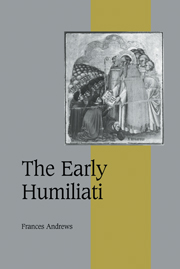Book contents
- Frontmatter
- Contents
- Acknowledgements
- List of abbreviations
- Map
- Introduction
- 1 Tradition and history
- 2 The beginnings of the Humiliati: the twelfth-century evidence
- 3 Quia in nullo peccabant: the inspection and approval of the Humiliati 1199–1201
- 4 Rules
- 5 In search of communities
- 6 New members and profession of vows
- 7 Unity and uniformity: the development of a centralised order
- 8 The Humiliati and the Church in the localities
- Conclusion
- Appendices
- Bibliography
- Index
- Cambridge Studies in Medieval Life and Thought: Fourth Series
Conclusion
Published online by Cambridge University Press: 02 November 2009
- Frontmatter
- Contents
- Acknowledgements
- List of abbreviations
- Map
- Introduction
- 1 Tradition and history
- 2 The beginnings of the Humiliati: the twelfth-century evidence
- 3 Quia in nullo peccabant: the inspection and approval of the Humiliati 1199–1201
- 4 Rules
- 5 In search of communities
- 6 New members and profession of vows
- 7 Unity and uniformity: the development of a centralised order
- 8 The Humiliati and the Church in the localities
- Conclusion
- Appendices
- Bibliography
- Index
- Cambridge Studies in Medieval Life and Thought: Fourth Series
Summary
This book has traced the remarkable passage of a movement condemned by pope and emperor in 1184 into an established order within the Church. It has been argued that this was in part possible because the Humiliati were a far more traditional movement than previously recognised and much closer to the establishment of the Church than the condemnation of 1184 might be thought to imply. There were, of course, novel developments, as contemporary observers such as the chronicler of Laon and Jacques de Vitry emphasised. Their attitude to manual work as a source of charity, as well as a blessing to the worker, was one important element. The exhortations of their lay members certainly caught the imagination of contemporary commentators. This preaching without authority and their insistence on holding private meetings and rejecting oaths provoked condemnation. Yet, from the very beginning, the Humiliati behaved and were perceived by contemporaries as members of the Church. Even in the twelfth century they received the support of prelates and legacies from the faithful. Evidence for persecution or hostility is extremely limited and may have been particularly linked to the area of Verona. The earliest commentator, the anonymous chronicler of Laon, who explains the condemnation of the movement in 1184, describes them defending, not attacking, the Catholic faith (pro fide Catholica se opponentes). Moreover, examination of the regime of the First and Second orders established in 1201 suggests that the idea behind the new order was very close to the ideas of the long-established orders of the Church. Their rule contained elements of both monastic and canonical life, emphasising the traditional virtues of chastity and obedience.
- Type
- Chapter
- Information
- The Early Humiliati , pp. 248 - 252Publisher: Cambridge University PressPrint publication year: 2000



